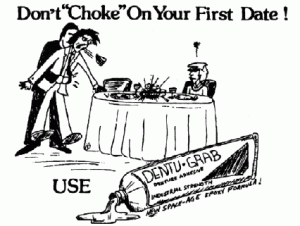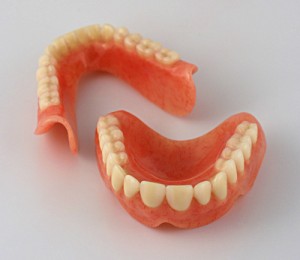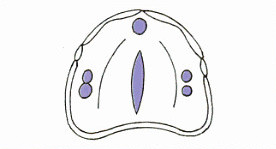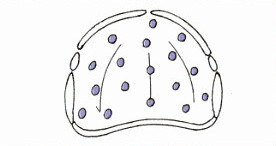 There are various advertisements nowadays that promote the benefits of using denture adhesives but the question is: do you need them? Do take note that adhesive for dentures are not meant for denture repairs, very loose or broken dentures. If your denture is in poor condition, it is best to check with your dentist whether you need an adhesive or an adjustment (reline/rebase) for your denture.
There are various advertisements nowadays that promote the benefits of using denture adhesives but the question is: do you need them? Do take note that adhesive for dentures are not meant for denture repairs, very loose or broken dentures. If your denture is in poor condition, it is best to check with your dentist whether you need an adhesive or an adjustment (reline/rebase) for your denture.
Denture adhesives have been around since the late 18th centuries and are currently available in three forms – powders, paste (denture glue) and wafers. They can be used for removable partial dentures and complete dentures.
What is a denture adhesive made of?
Usually a denture adhesive contains seven ingredients – basic ingredients (carbonyl methyl cellulose, vegetable gums, polymers etc.), coloring agents, flavoring agents, wetting agents, preservatives, plasticizers and dispersion agents.
What is the difference between the available forms?
The powder form, even though it is not long-lasting, is easier to clean out and is not messy with its smaller quantity. The initial hold of the denture for a powdered adhesive is sooner but shorter compared to the cream type that retains the denture longer. Wafer types are cut to fit the shape of the denture and are best used on a well-fitted denture. The amount required for efficient retention of denture is around 0.5 to 1.5g.
How do denture adhesives work?
Effectiveness of a denture adhesive depends on the water absorption which produces the “stickiness†and the chemical reaction (bio-adhesion) of the carbonyl groups contained in it.
Who should opt for denture adhesives?

You need to take care of your dentures
Adhesives can be indicated for well-fitted and moderately ill-fitted dentures. They help improve the retention and stability of dentures and provide psychological sense of security for specific denture wearers. Denture adhesives are also useful for handicapped patients and they simplify insertion of dentures for patients with tactile or movement deficiency.
However adhesives should not be used by those with ill-fitting dentures, worn out dentures or those prone to overuse the adhesives. They are also not meant for those with medication-induced xerostomia, physical inability to clean their dentures and those who are allergic to the contents of the adhesives (usually towards karaya, a vegetable additive). Furthermore, denture adhesives are not substitutes for a reliner or tissue conditioner so visit your dentist if you need to readjust your denture.
Why use a denture adhesive?
Adhesives decrease the likelihood of irritation in case of a new denture, increase retention and stability initially during chewing, speaking and swallowing as well as to provide psychological benefits of having a secure denture. Furthermore they give a cushioning effect to dentures, increase adhesion and cohesion of the denture-bearing surface and they can be used as a vehicle to apply medication onto the oral mucosa along with the denture.
Denture adhesives can be used to secure one day dentures (same day/temporary/immediate dentures) during the healing period after the surgical removal of teeth. The gums would shrink in 3 to 6 months time as the tooth sockets and gums heal, making the dentures loose and easily slip out.
Are there any problems arising from the use of denture adhesives?
Failure of denture adhesive can be due to illiteracy of users, improper or overuse and improper oral hygiene. Moreover, insoluble adhesives like denture pads can lead to destruction of the tissues in the mouth and adhesives are believed to support bacterial growth which can lead to oral problems.
How do I use denture adhesives?

Placement of powder denture adhesive © Textbook of Prosthodontics, Jaypee
Firstly the denture must be thoroughly cleaned prior to application and techniques may vary with form so do read the instructions provided carefully.

Placement of cream denture adhesive in the form of beads © Textbook of Prosthodontics, Jaypee
Generally for the powder form, the denture is moistened and an even coating is laid on the surface of the denture facing the soft tissues. Excess material is wiped away. If you have inadequate saliva, remember to moisten your denture before insertion.
For the cream form, it can be applied in two approaches.

Placement of cream denture adhesive in the form of drops © Textbook of Prosthodontics, Jaypee
In the first approach, thin beads or drops are placed along the depth of a dry denture at the front and back teeth regions. The cream is placed in the middle of an upper denture.
In the second approach, small drops are placed in 5mm intervals throughout the tissue surface of the denture.
Are there any instructions to follow for my denture care?
Residual adhesive on the surface of the denture has to be cleaned every day. Rinse your denture in water and scrub with a soft brush. Soak your denture in water or denture cleaner solution overnight. If soaked overnight, the adhesive absorbs more water making it more soluble and easier to rinse away. Remember to have your dentures checked by your dentist annually to ensure your denture and mouth are in tip-top condition.
Further information on how to care for your dentures can be found here.
Pingback: Everything you need to know about denture | Intelligent Dental